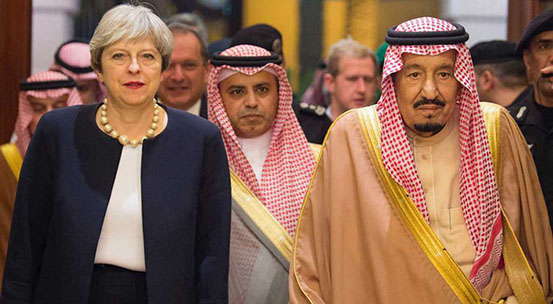Theresa May Seeking to Deceive British Public, Involvement in Killing Yemenis
YemenExtra
M.A.
After scandals over Britain’s involvement with Saudis, in their war against Yemen, Prime Minister Theresa May’s statement, on her way to the EU-league of Arab states summit in Sharm el-Sheikh, comes as a red herring. Britain has been providing combat intelligence and targets locations to Saudi Arabia, since the deadly Saudi-led aggression against Yemen began in 2015, which has killed thousands of Yemeni civilians and put millions on the verge of famine. May has pledged £200m to help victims of the war in Yemen as she said that the “situation in Yemen cannot go on. There must be a political settlement, this is the only way to end this crisis and the suffering it’s caused.”

May’s statements come just hours after nine British special forces experts were killed in the Southern regions of Saudi Arabia, according to a Yemeni military source. The killed British military officers were conducting a top-secret mission commissioned by the UK, the US, and the UAE, Taez news, a Yemeni news outlet, reported. The source added that the killed officers were experts in planning and managing military operations, and were tasked with commanding the Saudi-mercenaries foreign militants involved in the war against Yemen.
Last week, Britain’s Daily Express reported that two British Special Forces soldiers of the elite SAS regiment deployed on a top-secret joint US-UK mission in Yemen were injured in a roadside bomb blast. Both soldiers were in a 12-man coalition taskforce which flew into the wartorn country three weeks before that. The SAS is working alongside members of Operational Detachment Alpha, the primary fighting force for the Green Berets. Under US command, the heavily armed Special Forces team flew into Aden from Djibouti aboard a UAE Chinook helicopter and met UAE commanders before heading Northeast in unmarked pick-up trucks. Both soldiers sustained leg injuries and were evacuated in a Emirati helicopter to the US military base in Djibouti. According to observers, the British policy is no longer able to fill its contradictions scattered around Yemen. Britain can not claim “humanity” and participate in the war on Yemen.
While Theresa May has announced an additional $ 200 million to help Yemenis, international human rights organizations have revealed that the UK has licensed over £4.7 billion worth of arms exports, including missiles and fighter jets, to Riyadh over the course of the war. May has so far faced down calls for a ban on the weapons sales despite the growing humanitarian disaster. Faced with a pending exit from the European Union that will shutter most EU markets on Britain, the UK views Saudi Arabia and other repressive Arab regimes as lucrative post-Brexit markets for British weapons and goods, even though many of them have been blacklisted by the Foreign Office for human rights violations.
According to Amnesty International, the UK issued a total of 152 licenses for exports of military equipment to Saudi Arabia, topping £2.94 billion for a long list of weapons, including bombs, torpedoes, rockets and missiles. The UK’s total earnings from the war, according to reports from last September, soared to a hefty £6 billion. The numbers only include the officially announced deals and there is a growing fear that London and Riyadh have been making more deals in secret in order to avoid public pressure.
Despite the dire need for a ceasefire in the violence-scarred country, the huge profits out of arms sales prompted London last weekend to urge Germany to relax its ban on arms sales to Saudi Arabia. Jeremy Hunt, the British foreign secretary, has sent a private letter to the German foreign minister, Heiko Maas, to exempt big defence projects from its efforts to halt arms sales to Saudi Arabia, or face damage to both its economic and European credentials.
The Independent reported on Tuesday, that in Late in 2017, the Campaign Against the Arms Trade (CAAT) said that in the two years leading up to the war on Yemen, the UK government had approved £33 million worth of licenses covering the sale of bombs, missiles and countermeasures to the Riyadh regime. In the two years since the beginning of the Saudi-led bombing campaign in March 2015, the figure rose to £1.9 billion, up by 457 per cent, the CAAT added. It also found that the UK government licenses covering aircraft, including Eurofighter jets, have soared by 70 percent to £2.6 billion in the same period. Saudi Arabia and a number of its regional allies launched a devastating campaign against Yemen in March 2015, with the aim of bringing Hadi’s government back to power and crushing Ansarullah.

According to a report by the Armed Conflict Location and Event Data Project (ACLED), a nonprofit conflict-research organization, the Saudi-led war has so far claimed the lives of around 56,000 Yemenis. The Saudi-led war has also taken a heavy toll on the country’s infrastructure, destroying hospitals, schools, and factories. The UN has already said that a record 22.2 million Yemenis are in dire need of food, including 8.4 million threatened by severe hunger. According to the world body, Yemen is suffering from the most severe famine in more than 100 years.
A number of Western countries, the US and Britain in particular, are accused of being complicit in the ongoing aggression as they supply the Riyadh regime with advanced weapons and military equipment as well as logistical and intelligence assistance. According to a senior Yemeni military official, Saudi Arabia and its allies continue to target citizens with cluster bombs and internationally-banned arms in the northern province of Sa’ada and Hajjah, leaving 1,124 people dead and 1,665 others wounded, pointing out that most of the victims are children, and that most of the cluster bombs are made in America.
This post originally ran on Almasirah English

